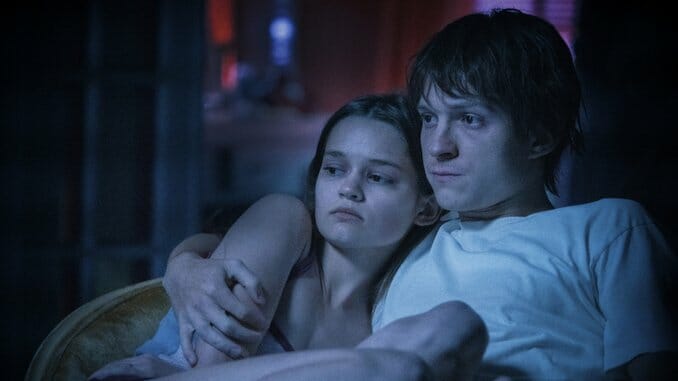Cherry Bombs

Cherry, the follow-up from directors Anthony and Joe Russo after their all-time box office record-setter Avengers: Endgame, is a strange beast. It takes one of their superhero super-stars, Tom Holland, and sets him as the nameless, milquetoast face of the poverty draft and opioid epidemic. Its hero is so down-and-out in the throes of addiction and PTSD that he goes on a spree of bank robberies. Clearly not a four-quadrant film. In fact, it’s sporadic and strange, answering every call for substance with style. It’s a boring watch, but an academically interesting film for the Russos to pick after their MCU dominance—one that wallpapers over its evocative premise and R-rated source material so heavily you’ll wonder why they chose it in the first place.
That blame can’t be shouldered by Holland, whose Man with No Name (credited as Cherry, but nobody ever calls him that and the word is only said once) is as hamstrung by the script as his character is by the various crises happening in America. The film—adapted from Nico Walker’s semi-autobiographical novel by Jessica Goldberg and the Russos’ sister, Angela Russo-Otstot—is a plodding would-be epic tracking this everyman from wimpy college kid to hilariously aged-up, mustached ex-con. The throughline for all this is his relationship with Emily (Ciara Bravo, trying her damnedest). Her main character trait is that she puts up with Holland’s character and wears a tiny little ribbon around her neck, an affectation that not only makes her seem even more childish than her performance, but that also makes you think that if she unties it, her head will roll off. The thought of Emily leaving him (she doesn’t) makes Holland’s character so sad that he joins the Army, setting this rube’s Goldberg machine in motion.
Bravo and Holland completely lack chemistry, even in the film’s steamiest scenes. Holland jerks off in a desert porta-potty to the thought of her (no, really) and it still never feels like either of these two see much of anything in one another. It doesn’t matter all that much, since their relationship is so baseless and silly that even if they smoldered like Bogie and Bacall we wouldn’t buy it, but the relationship’s so central that its ultimate emptiness leaves the core of the film hollow. That’s ok, because the rest of the film is just as bad.
Based on Cherry’s dramatic premise and lack of humor, you wouldn’t think it’d have the visual tone of a dark comedy. In fact, Jack Reynor’s drug dealer—dressed like a Halloween costume of a frat boy—is the only person on screen whose performance matches the look of the film. The aesthetic zips right past everything else. Somehow real environments look fakey, falsely lit and populated. The film’s tacky palette of color filters—sepia-toned, then bluish-grey once the drugs take over, except for a brief monotone jaunt with ecstasy (ah ecstacy, a drug known for desaturating the world) and the slew of scarlet-drenched title cards—are only the beginning.
There’s so much style-hopping sound and fury distracting from what’s actually beneath it all, signifying nothing but the Russos’ dedication to putting in every weird filmmaking flourish that didn’t fit in the MCU. Wide-angle lens, extreme close-ups, aspect ratio alterations, direct address, profane dialogue blown up to cover the screen—some feel like bad gags, others more like bottled-up expressions erupting out of directors repressed by the warehouses and green screens of their recent superhero work. And what’s perhaps the most unfortunate part of this whole affair is that every once in a while, one of these shots actually looks halfway decent—maybe because of cinematographer Newton Thomas Sigel (who shot last year’s Da 5 Bloods). But for every interesting composition, there are full hours of visual nonsense. If you ever wanted a POV camera looking out from Tom Holland’s asshole, Cherry’s got you covered.
-

-

-

-

-

-

-

-

-

-

-

-

-

-

-

-

-

-

-

-

-

-

-

-

-

-

-

-

-

-

-

-

-

-

-

-

-

-

-

-








































